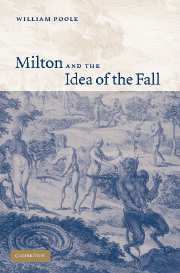Book contents
- Frontmatter
- Contents
- Acknowledgements
- Note on the text
- List of abbreviations
- Introduction
- Part I Fallen culture
- Part II Milton
- 7 Towards Paradise Lost
- 8 Paradise Losti: the causality of primal wickedness
- 9 Paradise Lostii: God, Eden and man
- 10 Paradise Lostiii: creation and education
- 11 Paradise Lostiv: Fall and expulsion
- Conclusion
- Notes
- Index
9 - Paradise Lostii: God, Eden and man
Published online by Cambridge University Press: 10 December 2009
- Frontmatter
- Contents
- Acknowledgements
- Note on the text
- List of abbreviations
- Introduction
- Part I Fallen culture
- Part II Milton
- 7 Towards Paradise Lost
- 8 Paradise Losti: the causality of primal wickedness
- 9 Paradise Lostii: God, Eden and man
- 10 Paradise Lostiii: creation and education
- 11 Paradise Lostiv: Fall and expulsion
- Conclusion
- Notes
- Index
Summary
Paradise Lost consistently inverts the order of the history it tells, giving us the fallen before the unfallen, and so denying us access to the former without the provision of the latter. When Eve, for instance, is created from a rib dug out of Adam's side, she inadvertently recapitulates the construction of Pandaemonium, the devilish assembly, a terminologically similar edifice: ‘Soon had his crew / Op'nd into the Hill a spacious wound / And dig'd out ribs of Gold’ (1.688–90). In a move we shall see again, Milton thus connects a nominally evil creation with a nominally good one, but does not tell us what we are to make of that association.
God too sees and discusses the Fall before it happens, but rather than defending this eventuality as a difficult battle lost, alas, and after much struggle, he confirms what the devils had supposed all along, that man will be easily overcome. The devils will plan to seek out man's weakness, and blast the ‘frail originals’ of the ‘pendent world’ (2.357, 375, 1052). God blithely admits all this, even repeating the ease with which man will fall: ‘For man will heark'n to his glozing lyes, / And easily transgress the sole Command, / … what Hellish hate / So easily destroy'd’ (3.93–4, 300–1). This is a Calvinist sentiment: the Reformer too had maintained that man fell ‘easily’.
- Type
- Chapter
- Information
- Milton and the Idea of the Fall , pp. 158 - 167Publisher: Cambridge University PressPrint publication year: 2005

